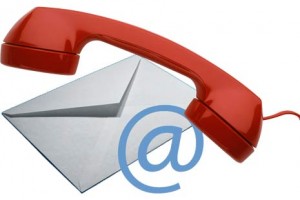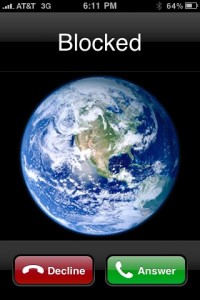 Prospects for job hunters aren’t exactly rosy right now. Unless you’ve been living in a cave (an option that seems increasingly attractive as rent levels continue to rise) you’ll have been confronted with some pretty ugly statistics about the jobs market. It’s a struggle, no two ways about it.
Prospects for job hunters aren’t exactly rosy right now. Unless you’ve been living in a cave (an option that seems increasingly attractive as rent levels continue to rise) you’ll have been confronted with some pretty ugly statistics about the jobs market. It’s a struggle, no two ways about it.
The time and effort required to do a good application is considerable. To receive a rejection, or even not to get a reply at all, is heartbreaking. However, finding out that you were made an offer but didn’t receive it feels even worse. Surprisingly this is not an uncommon occurrence. Making yourself as contactable as possible is one the absolute easiest ways to make sure you don’t miss out. It’s so simple that people forget to think about it. That can cost you a job.
Here are 3 things to look out for.
Check Your Junk Mail Folder and Job Site Accounts
Email filters often decide to stick a perfectly legitimate email into your junk folder and not your inbox. This is especially common with email addresses linked to the intranets of smaller businesses. Depending on the settings you use for your emails, these can be deleted after a while, or even immediately.
A friend of mine was undone by their junk mail filter just recently. Having spent a lot of time and care doing some really high quality applications they thought it odd not to have received any contact back. When they called around to follow up, they were they were astounded to hear that they’d been emailed with an invitation to interview, the date of which had passed and that they had failed to reply or to attend.
 It turned out the email had gone into his ‘junk’ folder and, after a little while, been automatically deleted. The recruiter he spoke to admitted it was not the first time such a mishap had occurred. Make sure it doesn’t happen to you. Regularly check your junk mail folder. You never know, in amongst the spam could be the response you’ve been waiting for.
It turned out the email had gone into his ‘junk’ folder and, after a little while, been automatically deleted. The recruiter he spoke to admitted it was not the first time such a mishap had occurred. Make sure it doesn’t happen to you. Regularly check your junk mail folder. You never know, in amongst the spam could be the response you’ve been waiting for.
You should also be aware that, if you’re applying for jobs through lots of different job seeker’s websites, that employers may not try and contact you through the details on your C.V. but through the site itself. Whilst most sites will allow you to simply make an application to the employer, who will then contact you directly if they’re interested, in some cases you will only see if you’ve had responses by logging into your account with that particular job site. It’s a good idea to use a spread sheet to keep track of which sites you’ve used to apply for which jobs so you’ll know where you’ll need to look to see if you’ve been successful.
Ensure Potential Employers Will Always Have a Way of Reaching You
This sounds obvious. Given that the ‘we’ll call you’ line has been used to close interviews for years now you might expect job-seekers to be perched by the phone all day with ears pricked, or constantly refreshing their browser to see if an email has come through with good news.
 However, while being a job hunter is itself like a full time job, you’ll still have a life and at some point you may be harder to reach.
However, while being a job hunter is itself like a full time job, you’ll still have a life and at some point you may be harder to reach.
For instance, I once went to visit a friend for the weekend. I packed my phone charger but a leaking bottle of water in my bag killed it, meaning my phone also died. My friend’s place didn’t have any internet connection and was nowhere near any internet cafés. As a result I missed a call and an email inviting me to an interview.
If, during your job search you are going away (if your going over seas, for example, your mobile may not work as usual) make sure you have a contingency plan for communications. The smartest thing to do if you know you are not going to be reachable through the usual channels (or whatever contact details you have on your C.V.) is to call the companies you are expecting to hear from a let them know the situation and an alternative way of reaching you.
It’s also a great idea to put some extra contact details on your C.V. For instance, you may not live at home, but putting down an alternate address and number could mean your parents, or any other back up you have, could receive a message for you and let you know. Again this sounds so simple but that’s exactly why people forget to do it.
Recruiters are all about speed. If they’re filling up places for a skills assessment day, they will get the first people who respond, often these calls come at very short notice.
Always Answer Blocked Numbers
 People often assume that even if they miss a call that a company will email them. Usually this is the case, but when your after a job you can’t afford to assume anything, so its vital to pick up your phone.
People often assume that even if they miss a call that a company will email them. Usually this is the case, but when your after a job you can’t afford to assume anything, so its vital to pick up your phone.
One graduate I knew (who’d had some trouble with nuisance phone calls in the past) had a policy of not answering blocked numbers. They checked their voicemail one day to find the calls they’d been rejecting were in fact job offers. They called back, only a day later, but the position had already been given to someone else.
You’ll find most people working in recruitment will use blocked numbers in the initial stages of contacting you (which is understandable considering the amount of call backs from disgruntled rejected candidates they would otherwise receive) and when your in the middle of a job search you should remember that an unrecognized number is actually exactly what you want to see flashing up on your phone’s display.
Frank Miller has a wealth of experience in the recruitment business. He is currently working on compiling a list of his top job search tips.
